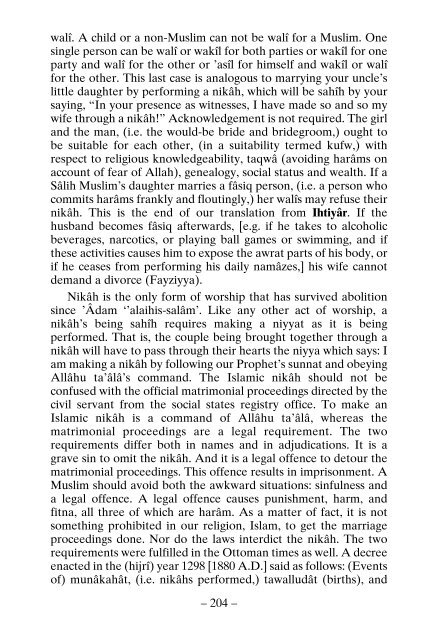O Son !
THE BOOK ‘O SON’ Al-hamdu lillâhi Rabbil ’âlamîn. Wa-s-salâtu wa-s-salâmu ’alâ Rasûlinâ Muhammadin wa Âlihi wa Sahbihi ajma’în. 1– O son! Collecting from books written by the scholars of the Hanafî Madhhab three hundred and sixty hadîth-i-sherîfs and forty-four khabars and also the seven essentials and the five rukns and the seven wâjibs and the fourteen sunnats and the twenty-five mustahabs and the fourteen mufsids of namâz, I have explained them for you. Adapt your acts and deeds to these teachings so that you attain fayz and nejât (salvation)! 2– Also for your information, I have collected a thousand and ninety âdâb (adabs) for you and for other young Muslims like you. If you adapt your actions and acts of worship to these teachings, they will be sufficient for you. If you laze, disobey Allâhu ta’âlâ and cease from these practices and manners, you will be afflicted with slavery and disgrace in the world and subjected to torment in the world to come. If you live up to them and advise your Muslim brothers to do the same, it will be useful for you. They will say blessings over you. And Haqq ta’âlâ will accept their invocations. For, a slave will be pardoned on account of another slave’s invocations for them.
THE BOOK ‘O SON’
Al-hamdu lillâhi Rabbil ’âlamîn. Wa-s-salâtu wa-s-salâmu ’alâ
Rasûlinâ Muhammadin wa Âlihi wa Sahbihi ajma’în.
1– O son! Collecting from books written by the scholars of the
Hanafî Madhhab three hundred and sixty hadîth-i-sherîfs and
forty-four khabars and also the seven essentials and the five rukns
and the seven wâjibs and the fourteen sunnats and the twenty-five
mustahabs and the fourteen mufsids of namâz, I have explained
them for you. Adapt your acts and deeds to these teachings so that
you attain fayz and nejât (salvation)!
2– Also for your information, I have collected a thousand and
ninety âdâb (adabs) for you and for other young Muslims like you.
If you adapt your actions and acts of worship to these teachings,
they will be sufficient for you. If you laze, disobey Allâhu ta’âlâ
and cease from these practices and manners, you will be afflicted
with slavery and disgrace in the world and subjected to torment in
the world to come.
If you live up to them and advise your Muslim brothers to do
the same, it will be useful for you. They will say blessings over you.
And Haqq ta’âlâ will accept their invocations. For, a slave will be
pardoned on account of another slave’s invocations for them.
Create successful ePaper yourself
Turn your PDF publications into a flip-book with our unique Google optimized e-Paper software.
walî. A child or a non-Muslim can not be walî for a Muslim. One<br />
single person can be walî or wakîl for both parties or wakîl for one<br />
party and walî for the other or ’asîl for himself and wakîl or walî<br />
for the other. This last case is analogous to marrying your uncle’s<br />
little daughter by performing a nikâh, which will be sahîh by your<br />
saying, “In your presence as witnesses, I have made so and so my<br />
wife through a nikâh!” Acknowledgement is not required. The girl<br />
and the man, (i.e. the would-be bride and bridegroom,) ought to<br />
be suitable for each other, (in a suitability termed kufw,) with<br />
respect to religious knowledgeability, taqwâ (avoiding harâms on<br />
account of fear of Allah), genealogy, social status and wealth. If a<br />
Sâlih Muslim’s daughter marries a fâsiq person, (i.e. a person who<br />
commits harâms frankly and floutingly,) her walîs may refuse their<br />
nikâh. This is the end of our translation from Ihtiyâr. If the<br />
husband becomes fâsiq afterwards, [e.g. if he takes to alcoholic<br />
beverages, narcotics, or playing ball games or swimming, and if<br />
these activities causes him to expose the awrat parts of his body, or<br />
if he ceases from performing his daily namâzes,] his wife cannot<br />
demand a divorce (Fayziyya).<br />
Nikâh is the only form of worship that has survived abolition<br />
since ’Âdam ‘’alaihis-salâm’. Like any other act of worship, a<br />
nikâh’s being sahîh requires making a niyyat as it is being<br />
performed. That is, the couple being brought together through a<br />
nikâh will have to pass through their hearts the niyya which says: I<br />
am making a nikâh by following our Prophet’s sunnat and obeying<br />
Allâhu ta’âlâ’s command. The Islamic nikâh should not be<br />
confused with the official matrimonial proceedings directed by the<br />
civil servant from the social states registry office. To make an<br />
Islamic nikâh is a command of Allâhu ta’âlâ, whereas the<br />
matrimonial proceedings are a legal requirement. The two<br />
requirements differ both in names and in adjudications. It is a<br />
grave sin to omit the nikâh. And it is a legal offence to detour the<br />
matrimonial proceedings. This offence results in imprisonment. A<br />
Muslim should avoid both the awkward situations: sinfulness and<br />
a legal offence. A legal offence causes punishment, harm, and<br />
fitna, all three of which are harâm. As a matter of fact, it is not<br />
something prohibited in our religion, Islam, to get the marriage<br />
proceedings done. Nor do the laws interdict the nikâh. The two<br />
requirements were fulfilled in the Ottoman times as well. A decree<br />
enacted in the (hijrî) year 1298 [1880 A.D.] said as follows: (Events<br />
of) munâkahât, (i.e. nikâhs performed,) tawalludât (births), and<br />
– 204 –

















